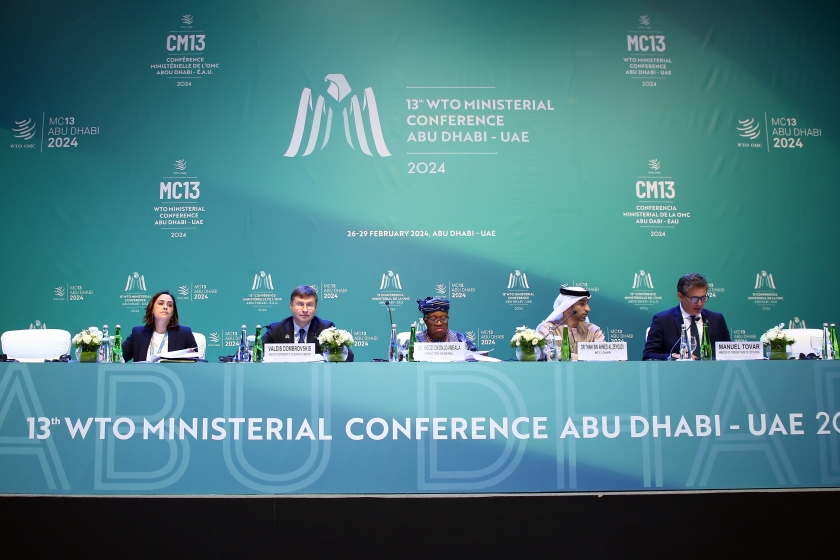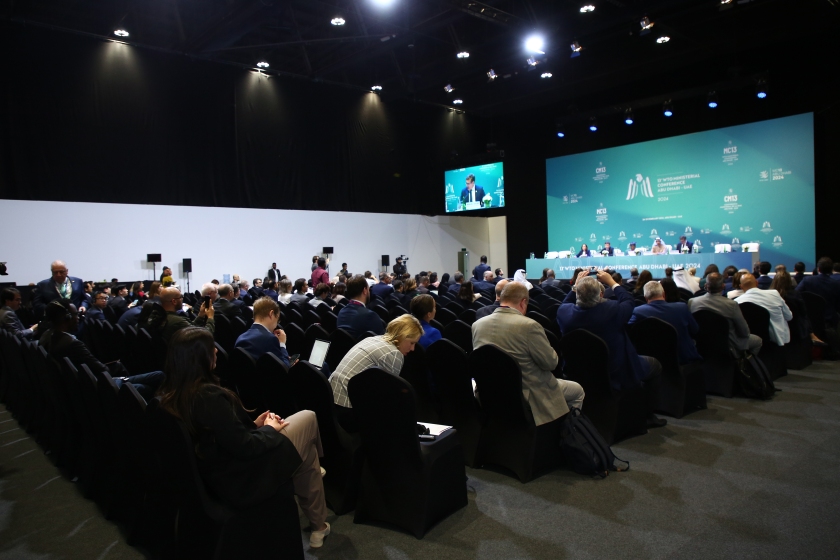SEE ALSO
Minutes show how domestic regulation deal in services schedules resolved
Objections dropped on services regulation say nothing about other plurilaterals
Experts: India, S.Africa unlikely to succeed in blocking WTO services deal
AND
Technical note: what are schedules of commitments in services?
Technical note: types of plurilateral deals and adding them to WTO rules
Explainer: The 18 WTO plurilaterals and ‘joint-statement initiatives’
Technical note: Participation in WTO plurilateral talks
(Original headline: “Plurilateral services commitments from 53 member certified, leaving 17 to go”.)
UPDATES April 5, 2024. The WTO Secretariat announced on April 4 that El Salvador’s revised services schedule had been certified because “the Secretariat has received no objections within 45 days as stipulated in the procedures”. The proposal was circulated on February 19, 2024.
In other words, India and South Africa never objected to El Salvador’s February 19 proposal, which seems to have gone straight to pasting in the domestic regulation disciplines, instead of linking to the reference paper. The following day, El Salvador circulated the supplement to its services schedule.
That meant 54 members’ schedules involving the plurilateral agreement had been certified, leaving 16 members’ schedules still uncertified (including the UK’s, facing post-Brexit objections from Russia). One more participant — Timor Leste — is not counted because it is still in the final stages of completing WTO membership.
March 28, 2024. South Africa dropped its objections to four more proposed revised schedules of commitments in services after they were corrected. We can assume that they continue the practice of pasting the new disciplines directly into the documents rather than simply link to the reference paper.
The four are from Albania, Canada, Georgia and South Korea, bringing the total of corrected documents so far to 31, from 58 members. (Chile’s was corrected twice; the UK’s is still uncertified because of post-Brexit Russian objections.)
India had not yet followed suit, so the four new corrected documents remain uncertified, and the certified total is unchanged
By Peter Ungphakorn
POSTED FEBRUARY 27, 2024 | UPDATED APRIL 15, 2024
At the last-minute India has dropped its objections, allowing a plurilateral agreement on streamlining domestic services regulations to be fully legal in 53 World Trade Organization members.
India’s announcement, circulated on the first day of the WTO’s Ministerial Conference in Abu Dhabi, follows South Africa’s almost two weeks ago
In a paper circulated on February 16, South Africa said it no longer objected to the 27 new commitments from 54 WTO members on services. India withdrew its objections on the same 27 revised lists (or “schedules”) of commitments in services.
This has allowed 26 revised schedules from 53 WTO members to be officially certified. One — from the UK — faces additional objections related to its departure from the EU (Brexit), but Britain said it would continue to apply the new disciplines anyway.
The schedules of another 17 participants in the domestic services regulation agreement have not been certified, apparently because they have not been amended to the satisfaction of India and South Africa.

India’s move allowed WTO Director-General Ngozi Okonjo-Iweala and the deal’s participants to proclaim that the agreement has “entered into force”. In practice this makes little difference since the participants can implement their commitments before certification, as usually happens when schedules are challenged.
The political significance of India’s and South Africa’s apparent change of heart is also limited.
What began as India and South Africa objecting in principle to negotiations only among some members (ie, “plurilateral”) seems to have ended up as a quibble about whether pasting new disciplines directly into schedules of commitments carries more legal weight than simply referring to an identical text published separately.
To a non-lawyer, that sounds like rationalising an objection that would never have succeeded anyway.
The truth is that the rules for schedules of commitments in services prevent countries from objecting indefinitely.
In the end India and South Africa would have had to seek compensation through arbitration, making a case that the agreement harms their rights and obligations — for an agreement that essentially makes them free riders. It creates no new obligations for them, and participants apply it without discrimination between participants and non-participants. (See this detailed explanation of the rules from the WTO Secretariat.)
The announcements at the Ministerial Conference that the revised schedules of commitments had now been certified were for: Argentina, Bahrain, Chile, China, Costa Rica, the EU (for the EU itself and for its 27 member states, with separate schedules for three newer members — Bulgaria, Croatia and Romania), Hong Kong, Iceland, Israel, Japan , Kazakhstan, Liechtenstein, Mauritius, Moldova, Montenegro, New Zealand, North Macedonia, Norway, Paraguay, Peru, Singapore, Switzerland, Thailand, Ukraine, United Arab Emirates and the US.
(At the time of writing the actual revised schedules are gradually being published here and the certifications here.)
They all contain additional changes — mainly presentational rather than altering any substance — following consultations with India and South Africa.
Before the latest corrections, the proposed schedules of commitments simply linked to a November 2021 reference paper containing the plurilaterally negotiated disciplines.
Instead, the certified schedules have the reference paper’s text pasted directly into the commitments, replacing the links.
One more has not yet been certified — Britain’s. Although India and South Africa dropped their objections to the UK’s as well, its post-Brexit schedule of services commitments still faces objections from Russia.
Moscow’s problem is based on a long-standing challenge about the legality of extracting the UK’s proposed commitments on services (and a correction) from the EU’s, first raised in January 2019 (documents S/L/423 and S/L/424). (See also explanation here.)
The UK issued a statement on the day the other schedules were certified (February 27) saying it “will continue to adhere to the Services Domestic Regulation disciplines” while consultations on its schedule are “ongoing”.
India and South Africa have not dropped objections to the proposed schedules of commitments from 11 other participants in the agreement: Albania, Australia, Canada, El Salvador*, Georgia, South Korea, Mexico, Nigeria, Russia, Saudi Arabia and Taiwan.
They have not yet corrected their proposed commitments to meet the two countries’ objections.
(* UPDATE: El Salvador’s proposed schedule was only circulated on February 19, 2024. Neither India nor South Africa objected to it. The schedule was certified on April 4 and circulated the following day)
Apparently, five more have not yet submitted commitments to include the new rules at all: Brazil, Colombia, Philippines, Türkiye and Uruguay.
One other participant is Timor-Leste, which is about to join the WTO — its membership has been agreed, but it needs to ratify the package and 30 days later it becomes a member.
As part of its membership package it will make commitments in services but we don’t know if the domestic regulation plurilateral is included.
![]()
PARTICIPANTS
Domestic regulation in services — plurilateral
February 13, 2024
Albania; Argentina; Australia; Austria; Bahrain; Belgium; Brazil; Bulgaria; Canada; Chile; China; Colombia; Costa Rica; Croatia; Cyprus; Czechia; Denmark; El Salvador; Estonia; European Union; Finland; France; Georgia*; Germany; Greece; Hong Kong, China; Hungary; Iceland; Ireland; Israel; Italy; Japan; Kazakhstan; Rep. Korea; Latvia; Liechtenstein; Lithuania; Luxembourg; Malta; Mauritius; Mexico; Moldova; Montenegro; Netherlands; New Zealand; Nigeria; North Macedonia; Norway; Paraguay; Peru; Philippines; Poland; Portugal; Romania; Russian Federation; Saudi Arabia; Singapore; Slovak Republic; Slovenia; Spain; Sweden; Switzerland; Chinese Taipei; Thailand; Timor-Leste**; Türkiye; Ukraine; United Arab Emirates*; United Kingdom; United States; Uruguay (71)
* Joined June 2022 | **An observer about to join the WTO
Sources are here
Plurilateral
These new commitments contain new rules on domestic regulations in services. They are the result of “plurilateral” negotiations — meaning they were talks among only part of the WTO membership — concluded in December 2021.
Altogether the deal has 71 participants but so far only 27 schedules from 54 members have been corrected to India’s and South Africa’s satisfaction.
The only document that was available publicly, apparently in error — Kazakhstan’s (see below) — shows how the latest revision of the schedules of commitments would paste the entire text of the plurilateral agreement (the reference paper) into each member’s schedule.
Each member would also recognise that doing so would not set a precedent for plurilateral agreements.
It is these changes that apparently satisfied India and South Africa.
Inserting this new plurilateral agreement into individual members’ schedules of commitments is possible because services, like goods, are an area of WTO work where members each make their own commitments.
It’s also possible because the deal does not discriminate — each participant applies the plurilateral disciplines to services provided by all other WTO members. Non-participants are free riders.

Dodging the consensus rule
Nevertheless, WTO members still face a controversial decision on whether to insert another plurilateral deal — investment facilitation — into the WTO rulebook.
Participants released their agreement publicly on the eve of the conference. They confirmed that they will press for a decision to include investment facilitation in the WTO rule-book but did not say whether they would do that at this or a future Ministerial Conference or at a future General Council meeting in Geneva.
A decision at the present Ministerial Conference seems unlikely. To make investment facilitation a formal part of the WTO Agreement under Annex 4 (on plurilaterals) requires consensus among all WTO members. India has said it will block doing so for investment facilitation.
Domestic regulation in services has avoided the need for consensus because each participant inserts the disciplines directly and unilaterally into its schedule of commitments — an option not available for investment facilitation.
The latest corrections were made to 27 documents asking for the schedules of commitments in services to be certified. This was the result of consultations with India and South Africa, who had objected.
By dropping their objections, India and South Africa have at least accepted that some new plurilateral rules can be put into practice by attaching them to schedules of commitments.
One other participant is Timor-Leste, which is about to join the WTO. As part of its membership package it will make commitments in service but these have not been revealed publicly yet, so we don’t know if the domestic regulation plurilateral is included.
Estimates by the WTO and Organization for Economic Cooperation and Development (OECD) suggest the agreement could potentially save trade costs by about US$150bn annually.
South Africa’s papers
South Africa says in its February 6 announcement, circulated as a restricted document:
“This is to notify that, following the submission of corrigenda to the original certification requests, South Africa has decided to withdraw its objections concerning the certification of the following Schedules of Specific Commitments, pursuant to paragraph 2 of the Procedures for the Certification of Rectifications or Improvements to Schedules of Specific Commitments (S/L/84):”
| Member | Certification Request | Objection by South Africa | Certification Corrigendum |
|---|---|---|---|
| Argentina | S/C/W/391 | S/L/474 | S/C/W/391/Corr.1 |
| Bahrain, Kingdom of | S/C/W/389 | S/L/474 | S/C/W/389/Corr.1 |
| Chile | S/C/W/404[1] | S/L/474 | S/C/W/404/Corr.2 |
| China | S/C/W/412 | S/L/474 | S/C/W/412/Corr.1 |
| Costa Rica | S/C/W/411 | S/L/474 | S/C/W/411/Corr.1 |
| European Union | S/C/W/407 | S/L/474 | S/C/W/407/Corr.1 |
| Hong Kong, China | S/C/W/399 | S/L/474 | S/C/W/399/Corr.1 |
| Iceland | S/C/W/397 | S/L/474 | S/C/W/397/Corr.1 |
| Israel | S/C/W/430 | S/L/474 | S/C/W/430/Corr.1 |
| Japan | S/C/W/401 | S/L/474 | S/C/W/401/Corr.1 |
| Kazakhstan | S/C/W/415 | S/L/474 | S/C/W/415/Corr.1 |
| Liechtenstein | S/C/W/394 | S/L/474 | S/C/W/394/Corr.1 |
| Mauritius | S/C/W/388 | S/L/474 | S/C/W/388/Corr.1 |
| Moldova, Republic of | S/C/W/408 | S/L/474 | S/C/W/408/Corr.1 |
| Montenegro | S/C/W/402 | S/L/474 | S/C/W/402/Corr.1 |
| New Zealand | S/C/W/413 | S/L/474 | S/C/W/413/Corr.1 |
| North Macedonia | S/C/W/418 | S/L/474 | S/C/W/418/Corr.1 |
| Norway | S/C/W/390 | S/L/474 | S/C/W/390/Corr.1 |
| Paraguay | S/C/W/414 | S/L/474 | S/C/W/414/Corr.1 |
| Peru | S/C/W/424 | S/L/475 | S/C/W/424/Corr.1 |
| Singapore | S/C/W/392 | S/L/474 | S/C/W/392/Corr.1 |
| Switzerland | S/C/W/400 | S/L/474 | S/C/W/400/Corr.1 |
| Thailand | S/C/W/395 | S/L/474 | S/C/W/395/Corr.1 |
| Ukraine | S/C/W/410 | S/L/474 | S/C/W/410/Corr.1 |
| United Arab Emirates | S/C/W/396 | S/L/474 | S/C/W/396/Corr.1 |
| United Kingdom | S/C/W/416 | S/L/474 | S/C/W/416/Corr.1 |
| United States of America | S/C/W/393 | S/L/474 | S/C/W/393/Corr.1 |
[1] Note that S/C/W/404/Corr.1 was issued in English only.
Its March 28 announcement has an identical main text and this list:
| Member | Certification Request | Objection by South Africa | Certification Corrigendum |
|---|---|---|---|
| Albania | S/C/W/417 | S/L/474 | S/C/W/417/Corr.1 |
| Canada | S/C/W/398 | S/L/474 | S/C/W/398/Corr.1 |
| Georgia | S/C/W/405 | S/L/474 | S/C/W/405/Corr.1 |
| Korea, Republic of | S/C/W/403 | S/L/474 | S/C/W/403/Corr.1 |
Kazakhstan
All of the corrected documents seeking certification for the schedules are restricted. Originally there was one exception, Kazakhstan’s. It indicated the changes that had been made and is here, in full. That was apparently an error: the document is now restricted. But the error allowed us to see what was going on.
The main points in the corrected request for certification are:
- certifying the new commitments does not set a precedent for other plurilateral agreements
- the new commitments do not reduce non-participants’ rights in services in the WTO or alter their obligations
- instead of simply referring to the negotiated reference paper, the entire disciplines are now pasted into the new commitments and called “Disciplines on Services Domestic Regulation”
This is a key excerpt:
![]()
As a result of these consultations, Kazakhstan submits a Corrigendum to its original certification request with the intended improvements relating to services domestic regulation reflected as attachments to Kazakhstan’s draft schedule, i.e., as “Disciplines on Services Domestic Regulation” and “Alternative Disciplines on Services Domestic Regulation for Financial Services.” No changes to the text of the disciplines referenced in the original certification request of Kazakhstan contained in document S/C/W/415 have been made.
Furthermore, Kazakhstan confirms the following understandings that are to be read in conjunction with the new additional specific commitments and are intended to provide context to them:
- For greater certainty, the present certification does not create a precedent for incorporating outcomes in the WTO, including from the Joint Statement Initiatives.
- The additional specific commitments do not diminish the rights nor alter the obligations under the General Agreement on Trade in Services of WTO Members that are not undertaking these additional specific commitments. Furthermore, they do not diminish any obligations under the General Agreement on Trade in Services of WTO Members undertaking these additional specific commitments.
- The additional specific commitments are without prejudice to the development of any necessary disciplines pursuant to paragraph 4 of Article VI of the General Agreement on Trade in Services.
- References to ‘Members’ or ‘Member’ included in the disciplines are to be understood as referring to the WTO Member undertaking these additional specific commitments. References to “other Members” are to be understood as referring to “other WTO Members”. The reference to “professional bodies of Members” is understood as referring to “professional bodies of WTO Members”.
Kazakhstan’s corrected draft schedule is attached both in clean (Attachment 1) and track‑change (Attachment 2) version for ease of reference.
That draft schedule (which is subsequently certified) then includes the whole of the plurilateral rules instead of referring simply to the reference paper, and the text at the start of the schedule is changed to reflect that.
At the time of writing all the actual revised schedules are gradually being published here, including for some EU member states where needed.
Updates:
April 5–15, 2024 — adding El Salvador’s new commitments in the updates box and in the text; adding the paragraphs about objections in principle becoming a legal quibble; minor editing for clarity, including on the numbers of members, participants and schedules
March 29, 2024 — reflecting South Africa dropping objections on four more schedules; some minor editing for clarity
February 29, 2024 — updating to reflect the publication of certified revised services schedules of commitments; adding the UK statement on implementing the disciplines; adding photos from the press conference
Image credit:
Main photo (green traffic light) | Davis Sánchez, Pexels licence
Services domestic regulation press conference, Abu Dhabi, February 27, 2024 | WTO/Prime Vision



